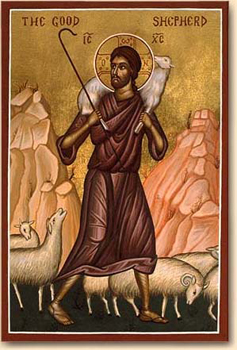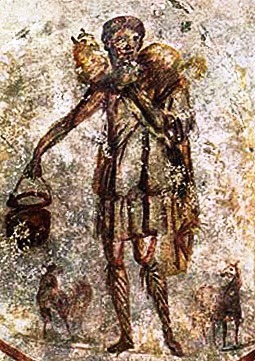For Sunday April 17, 2016
Lectionary Readings (Revised Common Lectionary, Year C)
Acts 9: 36-43
Psalm 23
Revelation 7:9-17
John 10:22-30
The question at the heart of this week's Gospel reading is a question for the ages: "How long will you keep us in suspense? If you are the Messiah, tell us plainly."
The setting is a late December day in Jerusalem. Jesus is walking in the portico of Solomon, an old and revered part of the Temple, and as usual, he's drawing a crowd. This time, the people gathered around him are devout Jews who've come to town to celebrate the Feast of the Dedication (better known to us as Hanukkah).
No doubt they've heard some wild rumors, or listened in on Jesus's enigmatic sermons, or witnessed one of his mind-boggling miracles. They are not unfamiliar with the teacher from Nazareth; they understand that he is complex and elusive. Hence the question: How long will you keep us in suspense? If you are the Messiah, tell us plainly.
When I was growing up — steeped in the church and steeped in Scripture — my friends and I took an arrogant pleasure in mocking Gospel characters who didn't accept Jesus's Messiah-ship from the get-go. "Why were they so thick?" we'd ask each other in smug amazement. "If we'd been there — if we saw the things the disciples saw, and heard the words the crowds heard — we would have believed on the spot."
 |
|
The Good Shepherd.
|
Yeah, right; thank God for the humility that comes with time. These days, my heart goes out to the people who questioned Jesus during his time on earth. Granted, their motives were mixed. Some were baiting him, hoping to provoke a gossip-worthy scandal. Others wanted Jesus to lead a revolution against Rome, or establish a rival religion, or wave his magic wand in the air and rain miracles from the sky. Some were simply eager debaters, hankering for a hot argument with a famous rabbi.
And yet. Something about their question still haunts me, because I know what it's like to feel as if God is keeping me in suspense — taking me on roundabout paths, keeping his silence, and making my spiritual journey more complicated than I believe it needs to be. I can't count the times I've started a prayer with the words of those people in the temple. "If you are." If you are good. If you are powerful. If you are merciful. If you are loving. If, if , if.
If you are the Messiah, then stop talking in riddles. Speak plainly. Behave predictably. Make my tiresome disbelief impossible. Take this world of swirling, dubious gray, and turn it black and white, once and for all.
How does Jesus respond? Well… not plainly. (Go figure.) And not — at first glance, anyway — kindly. "I have told you, and you do not believe," he says with discernible impatience in his voice. And then the icy clincher: "You do not believe, because you do not belong to my sheep."
Ouch.
I'll admit it: I've spent several days now wrestling with the harshness of that sentence. "You do not believe, because you do not belong to my sheep." What can such a stark, cut-and-dry pronouncement mean?
I suppose the easy dodge would be to insist that the sentence doesn't apply to me. After all, I'm a cradle believer. I grew up in the church. I know my Bible. I love the liturgy and I say my prayers. Surely I both believe and belong.
|
|
|
Good Shepherd, Russian icon.
|
Except when I don't. The nagging trouble with Jesus's indictment is that it does apply to my spiritual experience. Not rarely, but often. I doubt with alarming regularity. I question God's goodness, his power, and even his existence more often than I'd care to admit. I can't know for sure what the motivations of those people in the temple were on that long-ago December day, but I know my own. When I ask Jesus to stop keeping me in suspense, when I insist that he speak plainly, what I'm really saying is: "I don't trust you. I trust neither your willingness to speak to me, nor my capacity to hear your voice. You're supposed to be my Good Shepherd. I'm supposed to know, trust, and love your voice, but I very often don't. So what now?"
At first glance, Jesus's reply might appear to suggest that belonging to him depends on believing in him. But in fact, what Jesus says is exactly the opposite: you struggle to believe because you don't consent to belong. In other words, belief doesn't come first. It can't come first. Belonging does.
According to this text, whatever belief I arrive at in this life will come not from a creed or a cleverly worded sermon, but from the daily, hourly business of belonging to Jesus's flock — of walking in the footsteps of the Shepherd, living in the company of fellow sheep, and listening in real time for the voice of the one whose classroom is rocky hills, hidden pastures, and deeply shadowed valleys. If I won't follow him into those layered places — places of both tranquility and treachery — I will never belong to him at all.
I wonder if Jesus resisted the crowd's question that day because it was so pitifully inadequate. What good would it have done if he'd stood up in the temple at their insistence and yelled, "Yes! Yes, in fact, I am the Christ!" Would anything have changed? Suddenly, would his parables, his countercultural teachings, and his strange miracles have coalesced into an easy common sense? I doubt it. Jesus was a storytelling rabbi — far more interested in formation than in formula.
 |
|
The Good Shepherd, 3rd century.
|
Maybe, by refusing to "speak plainly" Jesus was honoring human life for the incredibly complicated thing it is. After all, one doesn't "speak plainly" about the greatest mysteries of the universe. Jesus came to teach us about truth, about love, and about eternal life in God's just and transformative kingdom. One doesn't simply profess belief in such weighty and mysterious things — one lives into them, questions into them, believes into them, grows into them.
Sheep know their shepherd because they are his; they walk, graze, feed and sleep in his footsteps, beneath his rod and staff, within constant earshot of his voice. So we believe in the Christ as we belong to him — as we allow ourselves to become fully and deeply his. He walks ahead of us, and we will only learn his path by walking it.
Image credits: (1) Wikipedia.org; (2) Wikipedia.org; and (3) Wikipedia.org.



